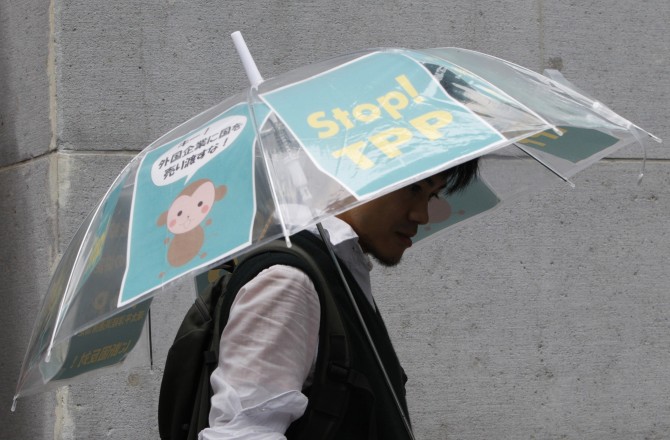US stance on TPP criticized

The Yomiuri Shimbun | August 25, 2013
U.S. stance on TPP criticized
Iwasaki Hiraku and Akihiro Okada / Yomiuri Shimbun Staff Writers
BANDAR SERI BEGAWAN, Brunei—After the 19th round of the Trans-Pacific Partnership multilateral trade negotiations concluded in Brunei on Friday, Malaysia and Singapore openly expressed opposition to U.S. demands, including its push for conclusion of the talks by year-end, indicating a rough road lies ahead for the negotiations.
During the two-day ministerial talks, Japan, which was participating in the talks for an entire round for the first time, tried to act as a mediator between the United States and Asian nations that oppose Washington’s haste to conclude the negotiations. By doing so, Japan was apparently trying to secure a footing in the talks.
The Brunei talks were aimed at breaking an impasse over such areas as tariffs, investment and government procurement as the 12 participating nations discussed specifics of each field.
The joint statement announced Friday after the talks states the 19th round of negotiations was held to “help drive the negotiations to conclusion on the 2013 time frame,” apparently at the initiative by the United States, with an eye to the U.S. mid-term elections in autumn next year.
However, serious gaps remain among the countries involved, as evidenced by comments of the Malaysian representative, who did not hide his displeasure toward the U.S. stance.
Chief negotiators of the 12 countries will continue to hold negotiations until the end of this month based on a list of subjects narrowed down politically by the ministers in the latest talks.
The joint statement listed seven subjects as “particular areas of focus” in the talks: market access (elimination of tariffs), services and investment, financial services, government procurement, protection of intellectual property rights, competition and environmental issues.
The ministers regard the October meeting of leaders of the TPP participating nations to be held on the sidelines of a meeting of the Asia-Pacific Economic Cooperation forum in Indonesia as an “important milestone” for the TPP talks.
Malaysian concerns
At a joint press conference held after the talks, ministers made remarks that tried to emphasize the conciliatory atmosphere of the negotiations. However, Malaysian representative Mustapa Mohamed, the country’s international trade and industry minister, poured cold water on the effort.
Asked by a reporter whether Malaysia was irritated by the negotiation tactics of the United States, he said he raised a number of concerns at the meeting, including U.S. pressure for a relaxation of the Malaysian government’s grip on state-owned enterprises. He seemed not to care about the presence of U.S. Trade Representative Michael Froman, who was sitting nearby.
Malaysia is uncomfortable with a U.S. proposal for rules to create conditions for state-owned enterprises, which have been given preferential treatment by the government, and private enterprises, to engage in fair competition.
The United States is strongly pushing the proposal to promote advancement of multinational enterprises, but it is not easy for Malaysia to accept new liberalization rules as there are a great many government-related companies in the country.
Certain progress
The TPP aims at not only trade liberalization through elimination of tariffs, but also high levels of liberalization on nontariff barriers such as rules controlling foreign participation in public works projects.
Including new fields of subjects that have not traditionally been the subject of trade talks, such as the environment and labor, the countries participating in the negotiations are trying to produce a comprehensive 29-chapter economic partnership agreement. The current format of the negotiations has been followed since 2010, when the United States joined the talks.
Discussions have been making progress in several fields, with negotiators coming very close to agreement. They include simplification of customs procedures and liberalization of telecommunications services.
Still, an early conclusion of the TPP talks is not in sight, and the latest ministerial talks were hastily held at Froman’s initiative. Progress in the talks requires the involvement of politicians, according to some observers.
To break the deadlock, such issues as correction of preferential treatments of state-owned enterprises, protection of intellectual property rights and elimination of tariffs must be solved.
At Friday’s press conference, Singaporean Trade and Industry Minister Lim Hng Kiang said he still believes the October deadline for reaching a TPP deal is likely out of reach, as he said in June.
’Considerable efforts needed’
Akira Amari, Japan’s minister in charge of TPP issues, said after the talks: “Participating nations must make considerable efforts” to conclude the talks within the year.
At his own press conference held after the ministerial talks Friday, Amari said, “While Japan has built a close relationship with the United States, we also have relationships of mutual trust with other Asian countries. Japan would like to play a role of a mediator.”
Okada is a correspondent based in Washington.





